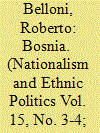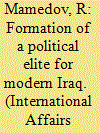| Srl | Item |
| 1 |
ID:
108697


|
|
|
|
|
| Publication |
2009.
|
| Summary/Abstract |
The process of implementation of the Dayton Peace Agreement in Bosnia has come to a halt. Particularly since 2006, nationalist rhetoric has increased, political, economic, and social reforms have stalled, and some analysts warn that the country might be sliding towards collapse. This article traces the roots of the current crisis in the 2006 failed constitutional reform attempt, which has highlighted the precarious state of the Bosnian political situation and, more broadly, in the limited impact of the international community's illiberal, top-down strategies employed in the country since almost the beginning of the peace process. It concludes by suggesting the need for a new approach, led by the European Union, and aimed at reviving the domestic political process.
|
|
|
|
|
|
|
|
|
|
|
|
|
|
|
|
| 2 |
ID:
173270


|
|
|
|
|
| Summary/Abstract |
THREE KEY EVENTS have changed both Iraq and the Middle East: the 1979 revolution in Iran, the Iran-Iraq war from 1980 to 1988, and the 1991 crisis in Kuwait. The latter led to a change in the domestic policies of Iraqi President Saddam Hussein and introduced new variables to the dynamics of the government's relations with ethnic and religious groups (mainly Shiites and Kurds). It was at this time that the UN began implementing sanctions on Iraq, including a blockade. The results of the sanctions left part of the elite with limited access to the distribution of resources; coupled with the government's practice of marginalizing a portion of the population, this led to migration and strengthening of exiled opposition forces. The U.S. brought not only economic but military pressure to bear on Baghdad. The U.S.'s tactical military incursions destroyed Iraq's infrastructure and disrupted the stable functioning of state structures.
|
|
|
|
|
|
|
|
|
|
|
|
|
|
|
|